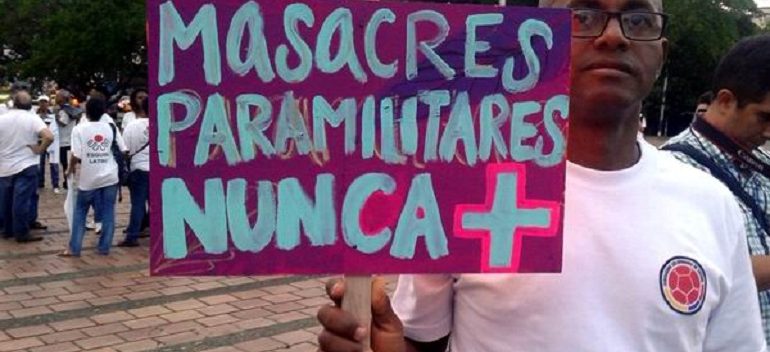
For more than a month, massive demonstrations have set Colombian streets ablaze in an unprecedented popular uprising against the neoliberal policies and corruption of the government of Ivan Duque.
The demonstrations, rapidly transformed into a national general strike, have been organized by the National Strike Committee (Comité de Paro, CNP), which brings together various social movements of the country, the major trade unions, peasant organisations, organisation of indigenous peoples (the Minga), students, feminist organizations, precarious youth and large sections of the middle class. A great social movement with diverse characteristics and demands, of course, but united in opposition to the government.
The spark that set off the protests is the tax reform proposed by the Duque government. Its objective was to reduce the tax deficit, sparing big companies and the country’s elites by making the working classes – already marginalized by years of neoliberalism – pay, through cuts in public services, increases in VAT on essential products (from 5% to 19%) and the introduction of new taxes on income hitherto exempt because considered too low.
The government’s response to the social mobilization has been military and extremely repressive. Since the beginning of the uprising, official figures report more than fifty dead, thousands of wounded, more than 130 missing, thousands of arbitrary detentions and dozens of cases of rape by the police/army. Several United Nations Special Rapporteurs and independent experts, as well as the Inter-American Commission on Human Rights, have condemned the repression of demonstrations. Dismayed by the excessive and illegal use of force, they are calling for investigations into the deaths and other human rights violations. One of their main concerns is the involvement of the military whose personnel is trained primarily to defend the country against military threats and should not be used to intervene during protests.
Popular pressure exerted by street demonstrations forced the government to withdraw the proposed reform and the Minister of Finance tendered his resignation. But that was not enough to calm popular anger which runs deep. The protests against tax reform were an expression of widespread discontent.
How did this situation arise?
In order to understand the nature of the protests and the demands of the Colombian people, we have to look well beyond the current situation. A brief historical retrospective is necessary.
Over the past 70 years, the country has been shaken by murderous civil war and by the determination of successive governments to eradicate any movement, any organization, any element that might threaten the interests of the economic and political elites of the country.
Today Colombia is the most inegalitarian country in Latin America and among the five most inegalitarian countries in the world. According to the Office of National Statistics, the poverty rate in the country rose from 35.7% in 2019 to 46.1% in 2020.
Corruption is also endemic. According to the Attorney General’s Office, since the start of the global pandemic in March 2020, 837 cases have been the subject of disciplinary proceedings, including 417 mayors, 26 governors and 32 city councillors and let us not forget former President Alvaro Uribe, who is the subject of around 30 legal proceedings for various crimes, ranging from espionage in the countryside, to links with paramilitary organizations and drug trafficking networks.
The country’s economic and industrial fabric is monopolised by a handful of large transnational corporations, which are active in Colombia’s most strategic sectors and control the country’s resources. There is no mystery; decades of unbridled neoliberalism have made Colombia an Eldorado for these economic giants – and a hell for the people.
In 2016, the Peace Agreement between the FARC guerrillas and the government raised a lot of hope. However, the agreement was not implemented and therefore did not solve the structural problems of the country; i.e., the question of land distribution, inequalities, social security, the marginalization of peasants, indigenous peoples and afro-descendants. Since 2016, 1000 leaders of social movements have been assassinated. In fact, the government has continued with its strategy based on repression and on the suppression of all dissenting voices in order to maintain the status quo.
Finally, the Colombian government has distinguished itself with its catastrophic management of the Covid 19 pandemic, which has resulted in nearly 100,000 deaths. According to John Freddy Gomez, political scientist at the National University of Colombia, the health crisis has been used as a pretext to accelerate the transfer of wealth from the rural to the urban areas and the dispossession of the working classes in favour of the well-to do. This will generate new cycles of accumulation and the imposition of new reforms towards yet more privatization and commodification of key economic sectors.
The events in Colombia must be seen in the light of this general context bearing in mind the economic development dictated by the Duque government.
And now?
On 15 June 2021, the Strike Committee announced the temporary suspension of demonstrations after almost 50 days, which does not imply the end of social mobilization. “We have decided to temporarily stop the mobilization” declared Francisco Maltès, President of the Central Labour Union. The union leader stated that “social mobilization will continue because the causes which generated it are still not resolved” and he announced the start of discussions to develop several bills in line with popular demand. It will now be a question of how Congress will react to these legislative proposals and how the government will orient its economic and social policy.
In many countries, there have been demonstrations of solidarity with the Colombian people. It is essential to continue to support the legitimate demands of the Colombian people so that this country may at last find peace.